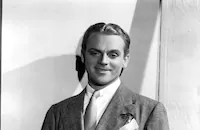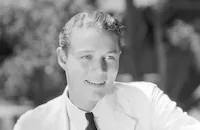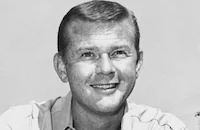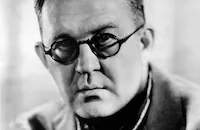Mister Roberts

Brief Synopsis
Cast & Crew
John Ford
Henry Fonda
James Cagney
William Powell
Jack Lemmon
Betsy Palmer
Film Details
Technical Specs

Synopsis
In April 1945, Lt. (j.g.) Douglas A. Roberts is a cargo officer on board the Reluctant , a Navy supply ship called the "Bucket" by its crew. Harbored near a South Pacific island that is far from the fighting, the crew suffers from intense heat, boredom and a tyrannical captain, who takes sadistic pleasure in undermining their morale. Roberts intervenes on the crew's behalf as much as possible. Watching him butt heads with the captain lifts the crew's spirits and provides almost their sole entertainment. However, Roberts, who quit medical school to fight the war, feels completely wasted aboard the "Bucket." Alone on watch one night, Roberts watches a convoy of fighting ships sail by and the next morning confides to Doc, the medical officer and his closest friend aboard ship, how much he aches to join them. Although Doc tries to convince him that standing up for the crew against the bullying captain is a valuable service, Roberts remains discontent. As a weekly ritual, Roberts writes the Navy Department to request a transfer to active combat, but his request is systematically vetoed by the captain, whose signature is required for approval. The captain, an uncouth ex-Merchant Marine, is threatened by Roberts' superior education and intelligence and the admiration given him by the crew. However, he expects that Roberts' hard work will help him get promoted. It has already won the captain an award for "superior cargo transfer," a palm tree that he displays proudly outside his cabin. For over a year, the captain has refused to approve leave and he frequently takes away movie nights and other small privileges. When the sailors discover that binoculars provide them with a clear view of the nurses's shower room in a hospital on the nearby coast, they experience their first release from drudgery in over a year. The ship's morale officer, young ensign Frank Thurlowe Pulver, who is also in charge of the ship's laundry, shares Roberts' quarters. Womanizer Pulver is also aware of the nurses, and finagles a trip to the hospital to pick up aspirin for Doc. While there, he convinces head nurse, Lt. Ann Girard, to come to the ship later by promising to share a bottle of scotch with her. Back on board, while preparing his bunk for seduction, Pulver is distressed to learn that Roberts, the owner of the scotch, has used it to bribe an official to send the Reluctant to a liberty port. Amused by Pulver's panic, Roberts and Doc mix up simulated scotch, called "jungle juice," from alcohol, Coca-Cola, iodine and hair tonic. Although Roberts admits that Pulver is "thoroughly likable," he accuses him of being, among other things, disorganized, and challenges him to finish one thing that he starts. As an example, he suggests that he carry out his idea of putting marbles in the captain's overhead. However, Pulver's fear of the captain renders him incapable of defiance. When Ann appears with the other nurses in tow, Pulver despairs of getting her alone. With Roberts' permission, Pulver pretends to be the ship's cargo officer. While he shows them around, the nurses, who are undeceived by his pretensions, discover the sailors' view of their quarters and leave immediately to hang curtains. When the Reluctant sails to the liberty port, the captain, who learns about Roberts' bribe, forbids the men to go ashore. Arguing that the men are "breakable," Roberts begs him to relent, finally winning the crew one night of shore leave at great personal cost: In return, he must cease questioning the captain's orders, especially in front of the men, and give up writing transfer applications. During their night onshore, the men, unaware of Roberts' concessions, unleash all their pent-up energy. They crash an Army dance, fight with soldiers, terrorize women, steal an admiral's goat and mistake the French Colonial governor's mansion for a bordello. Roberts hopes the night will give them strength for the "miserable, endless days ahead of them." The next day, the ship is banished from the port. The captain, livid at the blemish on his record, forces Roberts, in front of the crew, to assist in their punishment. Confused by Roberts' sullen compliance, the men are further mystified when he stops writing transfer requests, and his growing irritability makes them wonder if he is "bucking for a promotion." Later, upon hearing that Germany has surrendered, Roberts puts one of the crewmen, Dolan, on record for a minor infraction, and then, near tears, begs Doc to give him a medical transfer. Guessing that Roberts is suppressing resentment because he made an agreement on the men's behalf, Doc refuses and tells the concerned Pulver afterward that Roberts is panicking because the war is ending before he can join it. Trying to cheer Roberts, Pulver builds an explosive out of a toilet paper roll and some fulminator mercury, which he promises to throw under the captain's bunk. When Roberts laughs hysterically at the idea, he goes to the laundry room to test it. After an explosion, soapsuds flood the ship, and Pulver returns to say that his whole supply of mercury blew up by accident. The rebellion ends after the captain is told that a steam pipe broke. That night, Roberts apologizes to Dolan, but he and the other men respond coldly. Left alone on deck, Roberts listens to the radio broadcast of a speech that urges the free world to stand up to stupidity and arrogance. Inspired, he throws the palm tree overboard, then goes to bed. During the night, the captain, seeing the palm missing, sounds a general alarm. The men, at first believing they are under attack, scurry to find their battle stations and from there watch the ensuing "showdown." The captain, forgetting to turn off the p.a. system, accuses Roberts of breaking his promise and the men then realize that Roberts bought their night of liberty. Roberts remains calm in the face of the captain's spewing anger, and summons Doc when the captain almost passes out. The eavesdropping men thoroughly enjoy the drama of the night and when Roberts emerges from the cabin, their admiration is obvious. Weeks later, Roberts receives orders to transfer to a destroyer stationed in Okinawa, which surprises him, as he has not requested a transfer in months. While packing, he mentions to Doc that, as far as the men are concerned, he is easily replaceable. Doc, however, confides a secret: The men forged a transfer request and then forged the captain's signature of approval, to show their gratitude to Roberts for getting them shore leave. Before he leaves, the men toast Roberts with "jungle juice" dispensed from a fire extinguisher and present him with a handmade medal shaped like a palm tree and inscribed, "Order of the Palm, for action against the enemy above and beyond the call of duty." Deeply moved, Roberts puts on the medal, salutes and leaves. Some time later, the captain orders a 24-hour watch on a palm tree he has dug up to replace his prized one. Pulver, who has been assigned Roberts' position, frets over confronting the captain about showing a movie to the men. At mail call, Pulver receives from Roberts a letter written three weeks earlier. Having gained perspective from his new post, Roberts writes philosophically about the courage the Reluctant men showed while surviving monotony. Although Roberts is now where he needs to be, he is proud to have served with them and treasures their medal more than a Congressional Medal of Honor. A second letter Pulver receives, which was written by a friend serving on Roberts' ship, reports that Roberts was killed by a Japanese suicide bomber while drinking coffee in the ship's wardroom. The men mourn, but Pulver, emboldened by shock, throws the captain's palm tree overboard, pounds on his cabin door and belligerently demands, "Now what's all this crud about no movie tonight?"

Cast

Henry Fonda

James Cagney

William Powell

Jack Lemmon

Betsy Palmer

Ward Bond

Phil Carey

Nick Adams

Perry Lopez

Ken Curtis
Robert Roark

Harry Carey Jr.
Pat Wayne
Frank Aletter
Tiger Andrews
Fritz Ford
Jim Moloney
Buck Kartalian
Denny Niles

William Henry
Francis Connor
William Hudson
Shug Fisher
Stubby Kruger
Danny Borzage
Harry Tenbrook
Jim Murphy
Kathleen O'malley
Maura Murphy
Mimi Doyle
Jeanne Murray
Lonnie Pierce

Martin Milner

Gregory Walcott

James Flavin
Jack Pennick
Duke Kahanamoku
Clarence E. Fronk
George Brangier
Carolyn Tong
Crew
Gordon Bau
George Boggs
Norman Cook
Earl N. Crain Sr.
Leland Hayward
Winton Hoch
Howard A. Hohler
Irvin Jay
William L. Kuehl
Art Loel
Joshua Logan
Commander Merle Macbain Usn
Stanley Martin
Jack Murray
Frank Nugent
Edward O'fearna
Dale Pickett
Admiral John Dale Price Usn (ret.)
Leonid Raab
Wingate Smith
Robert Sunderland
Franz Waxman

Photo Collections
Videos
Movie Clip



Trailer
Hosted Intro





Film Details
Technical Specs

Award Wins
Best Supporting Actor
Award Nominations
Best Picture
Best Sound
Articles
Mister Roberts (1955)
Mister Roberts (1955) started as a novel by Thomas Heggen, but became popular when it hit Broadway as a stage play in 1948, written by Heggen and Joshua Logan. The play starred movie actor Henry Fonda who had left Hollywood after making Fort Apache (1948) with director John Ford. For once, that turned out to be a wise decision, as the play became one of Broadway's most popular hits.
When Logan and the play's producer, Leland Hayward, went to Warner Brothers to make the film version, Fonda felt there was little chance he would be given Roberts. After all, he was then nearly fifty years old and Roberts was written as being a man in his twenties. In fact, Warner Brothers would have preferred Marlon Brando or William Holden in the lead. However, one of the first decisions the producing team made was bringing Ford onboard as director and Ford demanded Fonda. To make Fonda seem younger, most of the rest of the cast was populated with older actors; fifty-five year old James Cagney as the dictatorial Captain Morton and, after Spencer Tracy turned down the role, sixty-two year old William Powell for Doc. For the young Ensign Pulver, Ford chose a little-known actor who had made a screen test for his previous movie The Long Grey Line (1955)- Jack Lemmon.
As the filming began, sailing could not have seemed smoother. Ford used his Navy connections to find one of the old cargo scows to use for the story's setting and boat; cast and crew were all sent to Midway Island for exterior shooting. Why it all went wrong is a matter of controversy. After years playing Roberts on stage, Fonda felt he owned the role and knew how it was to be played. Ford had other ideas, introducing bits of broad physical comedy, inventing new situations and, allegedly, throwing more attention to Lemmon's Pulver than Fonda's Roberts. Fonda kept his mouth shut but Ford could tell he was dissatisfied. One night, Ford confronted Fonda in his quarters while Fonda was having a meeting with Hayward. "I understand you're not happy with my work," Ford muttered and, when Fonda confirmed it, Ford charged him, swinging wildly. Fonda managed to hold him back and Ford later apologized. The damage, however, was done and was irreparable.
Ford continued directing the movie into the next month but could not handle being subservient to an actor. His way of dealing with the humiliation was drinking, keeping an ice chest full of beer nearby and downing up to two cases a day. After exterior shooting was completed, Ford was hospitalized with a gall bladder attack. The day he went into hospital for surgery, he was replaced by Mervyn LeRoy, the director of I Am a Fugitive from a Chain Gang (1932) and Quo Vadis? (1951). LeRoy shot all the studio-bound interiors except for two scenes, the laundry scene and Pulver's final message to the Captain, both of which were directed by Joshua Logan.
Those who knew the play well from Broadway were unhappy with the end result but their perspective may have been colored by unrealistic expectations. Movie audiences loved Mister Roberts, making it 1955's third-biggest box office hit, and earning Jack Lemmon his first Academy Award. Ford went on to what many feel was his greatest movie, The Searchers (1956), while Fonda had a long career of acting triumphs. But these two former friends never worked together again.
Producer: Leland Hayward Directors: John Ford, Mervyn LeRoy (and Joshua Logan, uncredited)
Screenplay: Joshua Logan, Frank Nugent based on the novel by Thomas Heggen and the play by Joshua Logan and Thomas Heggen
Cinematography: Winton Hoch
Music: Franz Waxman
Editing: Jack Murray
Art Direction: Art Loel
Cast: Henry Fonda (Lt. Douglas Roberts), James Cagney (Capt. Morton), William Powell ('Doc'), Jack Lemmon (Ensign Frank Pulver), Betsy Palmer (Lt. Ann Girard), Ward Bond (Chief Petty Officer Dowdy).
C-122m. Letterboxed.
by Brian Cady

Mister Roberts (1955)
Quotes
I looked down from our bridge and saw our captain's palm tree! Our trophy for superior achievement! The Admiral John J. Finchley award for delivering more toothpaste and toilet paper than any other Navy cargo ship in the safe area of the Pacific.- Doug Roberts
Captain, it is I, Ensign Pulver, and I just threw your stinkin' palm tree overboard! Now what's all this crud about no movie tonight?- Ensign Pulver
We've got nothing to do with the war. Maybe that's why we're on this ship, because we're not good enough to fight. Because our glands don't secrete enough adrenaline, or our great-great-grandmothers were afraid of the dark or something.- Doug Roberts
Captain, you told me...- Doug Roberts
Never mind what I told you. I'M TELLING YOU!- Capt. Morton
How did you get in the Navy? How did you get on our side? Oh you ignorant, arrogant, ambitious... keeping sixty-two men in prison 'cause you got a palm tree for the work they did. I don't know which I hate worse, you or that other malignant growth that stands outside the door- Doug Roberts
Why, you stinking little...!- Capt. Morton
How did you ever get command of a ship? I realize in wartime they have to scrape the bottom of the barrel, but where did they ever scrape you up?- Doug Roberts
There's just one thing left for you, Mister. A general court martial!- Capt. Morton
That suits me fine, court martial me!- Doug Roberts
Trivia
'Powell, William' 's last film.
Henry Fonda reprises the title role that he originated on Broadway (for which he won a Tony Award in 1948).
The ship used for filming is the fishing vessel "Ghost."
When the stunt man (hired to do the motorcycle going off the pier stunt) refused to do the stunt, John Ford hired a bystander who couldn't ride a motorcycle but had the nerve to try the stunt. The "bystander" was a young Marine named Jack Lewis, who wasn't even an experienced rider. However, being young and foolish, Lewis said, "Sure, I'll do it." The Marine Corp. wouldn't let John Ford pay Lewis the $700 he offered, so Ford went into the nearby Hilton hotel and told the management that Lewis could drink in the bar on Ford's tab for the next year. Lewis went on to become an author ("Chosen Tales of Chosin;" "The Sandtrap Marines") and publisher of magazines ("Gun World") and trade paperbacks ("Gun Digest Book of Guns," etc.), but one who maintained friendships with many in the movie business, including numerous cowboy film stars.
The part of Doc was originally offered to Spencer Tracy, who declined.
Notes
An acknowledgment and a prologue after the opening credits read: "We gratefully acknowledge the cooperation of the United States Navy whose men, vessels and installations in the Pacific made this motion picture possible. This story takes place in the waning days of the Second World War aboard a navy cargo ship operating in the back areas of the Pacific. In the Navy Register it is listed as THE RELUCTANT, but to its crew it is known as 'The Bucket.'" The four lead actors listed in the opening credits are not listed with the other players in the end credits. Orange Productions, Ltd. was an independent company owned by Leland Hayward and Joshua Logan, who adapted the original stage play from Thomas Heggen's novel.
A February 1953 Daily Variety news item announced that Hayward, Mister Roberts' Broadway producer, was considering a 3-D film deal for the property. The news item predicted that neither the play's Broadway director, Logan, nor its lead, Henry Fonda, would work on the film due to prior commitments. Although Warner Bros. production notes for the film claimed that Fonda was the "only man thought of for the title role," modern sources state that William Holden was first offered the role of "Doug Roberts." Holden turned it down, saying that Fonda was so identified with the role after 1,600 performances that he "owned" it.
According to modern sources, Warner Bros. hesitated in casting Fonda because they believed he was too old for the part, and felt that he had been away from feature films long enough to be forgotten by the general public. His previous film had been the 1948 John Ford-directed RKO production, Fort Apache. A September 1953 Daily Variety, January 1954 New York Times and Hollywood Reporter news items reported that Marlon Brando was cast as Roberts, but when director Ford was assigned to the film, he insisted that Fonda, who, like himself, had been in the Navy and served in the South Pacific during World War II, and whom Ford had directed in six previous films, play the role. By February 1954, a Hollywood Reporter news item announced the casting of Fonda.
According to an October 1954 Los Angeles Times article, Ford borrowed Jack Lemmon, who portrayed "Ensign Pulver," from Columbia. Pat Wayne, who played "Bookser" in the film, was the son of John Wayne. Television and film actor Tige Andrews (1920-2007), who made his feature film debut in Mister Roberts, was billed onscreen as "Tiger Andrews." Although his appearance in the film has not been confirmed, an August 1954 Hollywood Reporter news item adds Jim Lilburn to the cast. According to a modern biography of Fonda, Eva Marie Saint was cast as a nurse, but was later replaced because she was considered too attractive for the part. The source also stated that Ford originally assigned John Patrick as screenwriter, but later replaced him with his son-in-law, Frank Nugent.
An August 1954 New York Times article reported that Ford planned to "stick close to the play," although he and Nugent had to "wash out" some of the "vulgar language." Ford also remarked that several of the play's minor subplots, such as a nurse's birthmark, were replaced by other comic sketches, such as the explosion of soap bubbles in the ship's laundry. The Hollywood Reporter review would later note that the humor in the film "often skips into zany slapstick" and the New York Times would praise "screamingly funny scenes which, in several instances, are visual improvements on the play." However, modern sources report that Fonda, having strong opinions after playing the role for many years, was uncomfortable about the changes and feared losing the subtlety of the play's original concept of boredom at sea.
Filming began in late August 1954. Modern sources state that Ford was drinking more heavily than usual, causing him to behave erratically, and that actor Ward Bond helped direct when Ford was too inebriated. According to various modern sources, which vary in the details, Fonda, unhappy with Ford's concept of the film, complained to him in private and was "slugged" in response. Two months into production, Ford was hospitalized for a gall bladder removal operation, and some modern sources say that he was also hospitalized to "dry out" from his alcoholism. All Hollywood Reporter production charts, ending in November 1954, listed Ford as director, but January 1955 Hollywood Reporter and Variety news items reported that Mervyn LeRoy replaced Ford when the latter was forced to undergo emergency surgery, and that the two directors would share screen credit.
Although modern sources state that LeRoy tried to direct the film the way he thought Ford would have wanted, in a modern interview, LeRoy claimed that he changed the role of "Doc" from an alcoholic, as Ford made him, back to the original sober character in the play. Fearing bad publicity regarding his takeover of the directing reins, LeRoy said he hired his own press agent, Arthur P. Jacobs, who would later produce many feature films. According to modern sources, Logan also directed portions of the final film and directed the editing; however, in the opening credits, only Ford and LeRoy are billed as director. Although Ford received top billing, LeRoy's name, superimposed over a shot of the sea, is brighter and seems to shimmer.
According to October 1954 Hollywood Reporter news items, portions of the film were shot in Honolulu and Kaneohe Bay on the Hawaiian island of Oahu. Another location site, according to Warner Bros. production notes found in the AMPAS file for the film, was the Naval Station Midway, which was the last Allied-held base between Pearl Harbor and Japan during World War II, and the scene of one of the biggest air battles in history. Ford was familiar with the area, having directed the documentary The Battle of Midway, and Heggen had served in the Navy at Midway during World War II. Other location sites, according to Hollywood Reporter news items, included the cargo ship USS Hewell, and for night shots, the U.S. Marine Air Station on Kaneohe Bay, HI. Interior scenes were shot at the Warner Bros. soundstage.
Before the premiere, Mister Roberts was promoted on Ed Sullivan's Toast of the Town television show on the CBS network, which aired on June 19, 1955. The film was also publicized with a cover story in Life. Mister Roberts marked the last film of William Powell, who retired from the screen and died in 1984. The New York Times review praised the film for retaining its "picturesque ribaldry within the bounds of the Production Code" and named it one of their top ten films of 1955. The film received an Academy Award nomination for Best Motion Picture, but lost to Marty. Jack Lemmon won an Academy Award for Best Supporting Actor for his performance in the film, and William A. Mueller was nominated for best sound recording, although he lost to Oklahoma's Fred Hynes.
In 1964, a sequel to Mister Roberts, Ensign Pulver, was produced by Warner Bros. and directed by Joshua Logan. It starred Robert Walker, Jr., Burl Ives and Walter Matthau. A television show, Mister Roberts, aired on the NBC network during 1965-66.

Miscellaneous Notes
Voted One of the Year's Ten Best Films by the 1955 National Board of Review.
Voted One of the Year's Ten Best Films by the 1955 New York Times Film Critics.
Winner of an Award for Outstanding Directorial Achievement by the 1955 Directors Guild of America.
Winner of the Writers Guild of America Award for Best-Written American Comedy for 1955.
Released in United States Summer July 1955
John Ford was replaced by Mervyn LeRoy in the last weeks of shooting after the former had suffered a gall-bladder attack brought on by heavy drinking.
CinemaScope
Released in United States Summer July 1955
















